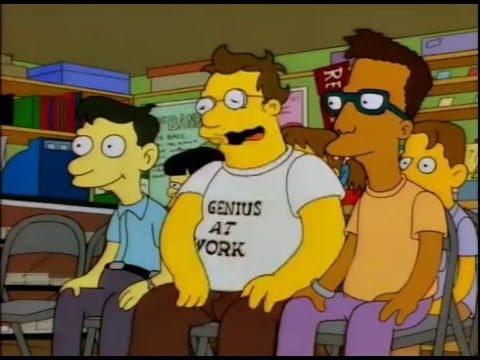CLASSIC Simpsons: Introduction
Fulfilling the world's need for more episode-by-episode Simpsons analysis
I know I’m not alone in having been deeply warped by The Simpsons. Line-reads, dialogue patterns, and visual gags from the show make a permanent dwelling in the psyche of the Simpsons-head. For our kind, the most innocuous daily happenings trigger the compulsion to make a reference. Every conversation between us risks a descent into a potentially endless succession of bits. Sometimes these exchanges last for hours. This tendency can alienate even the mild Simpsons appreciators in our company. There are many such cases. It’s pathological.
Such conversations often lead to questions about favourite episode, season, or character. Despite almost 30 years of watching the show, I simply don’t have a real answer to any of these questions. Paralyzing doubt creeps in any time I think I might’ve come up with one. And so I stumble in my attempt to come up with an answer on the spot. And this stumbling makes me feel a sort of shame. The show means too much to me to half-ass some kind of answer, but I know I should have an answer.
Besides this, I feel a sort of morbid curiosity about the last few decades of the show. I stopped watching and am generally in the pessimistic camp, despite some trusted friends tell me good episodes still appears every now and then. My responsibility with this project, I think, is also to trace the show’s fall from grace in detail, and to salvage episodes- maybe even seasons- that may be at least somewhat worth watching for Simpsons-heads who threw in the towel somewhere around Season 12-15. Discovering the best of the best will be the brief bliss of this project— plummeting into the depths of what’s worst will be the price paid.
To start 2023, I find myself under-employed and full of new year ambition. So, I've decided to get rolling on a project I’ve been thinking about for way too long. Years ago, I began dreaming up a scale that would help me determine my opinions on the best seasons and episodes of the show. The time has come to put it to use; it’s called The CLASSIC scale, and it works like this:
Characters— how does the episode utilize the Simpsons and / or secondary characters outside the family? Do character motivations make sense and drive the story? Does the episode introduce new characters? Explore existing ones and reveal something interesting or funny about them? If there is a cameo, is the celebrity characterized well?
Laughs— how funny is the episode? Is the comedy consistent from scene to scene? Are there just a few huge moments that really pay off (or fail to)?
Artistry— does the music, illustration, acting, or writing transcend the usual standards of the show?
Story— what’s going on with the plot? Is it particularly significant or interesting, or just a vehicle for jokes? Are all three acts strong— or maybe they part from a three act structure? Is the storyline feeding the best bits, or are they throwaway gags apart from the plot?
Setting— what does Springfield, or the world outside the Simpson’s home in general, contribute to the episode? Does the episode reveal anything about Springfield’s cultural, social, or political life? If they leave Springfield, where do they go, and what does it do for the episode?
Irreverence— “lack of respect for people or things that are generally taken seriously.” This is a word that has been used to both praise and hate on The Simpsons. What, if anything, is being lampooned by the episode? Is there some kind of cultural commentary going on in the episode, and how well does this play?
Classic-ness— has the test of time elevated this episode- or aspects of the episode, at least- to the status of a classic? Or has it settled into something a little more… average? Has the episode left some kind of cultural imprint or legacy?
I should note: an episode that doesn’t emphasize a given category won’t necessarily be judged negatively for that. Any of these categories (except maybe Laughs) can also benefit an episode in their relative absence if it somehow serves the episode as a whole.
Each will be graded on a 1-10 scale. Then, that score out of 70 will be converted into a percent and divided by 10 (for example, 48.5 / 70 = 69.2% = 6.9 / 10). The values will be correlative to the following scale. (The is based on what I use as a grader when marking undergraduate papers, lol):
You may say my scale isn’t very scientific. That it leaves out valuable things. That it includes arbitrary categories; that these things shouldn’t be equally weighted; or that some of them shouldn’t be weighed at all. To which I say: 1) you’re probably right, but 2) I wanted a scale with a cool name and this was the best way to make that happen and 3) we’ll figure it out as we go along.
Basically, I don’t want my take on what’s best to be based on nothing but vibes. I want to be able to give an account. Ideally, the project will allow me to say: “my top 5 episodes are v, w, x, y, and z and I give z the edge over x because it scored .35 higher on the Classic scale.” Or “yeah, I know seasons v-z are past-prime, but I actually found season x ranks pretty close to the classics.” Stuff like that. I want to figure out what I think about the show, and why I think what I think about the show. In the process, I’ll try to track interesting character developments, writing trends I notice, season-by-season vibe-shifts. Things like that.
So, that’s that. We’ll see where it goes. If you read this far, thanks for your time. I hope you’ll stick around and argue with me about my reviews.



